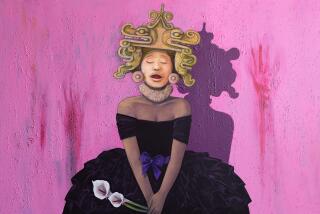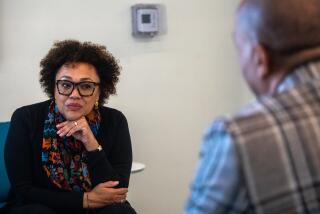Ofelia Esparza, Chicana altarista, receives top NEA honor for folk art that carries on an East L.A. tradition
She was born in East Los Angeles in 1932. At 86, she lives four blocks from where she took her first breath.
Much has changed in her 8 1/2 decades of life, but one thing has stayed the same: Ofelia Esparza remains devoted to the art of making Day of the Dead altars, a tradition descended from her mother, and her great grandmother before that.
Esparza is a proud and “blessed” Chicana altarista, part of a long line of devotees to the craft, which she has in turn passed on to her nine children, and they to her 16 grandchildren and 10 great-grandchildren.
Wednesday, Esparza added a new blessing to her long list when the National Endowment for the Arts announced she is among the recipients of a 2018 NEA National Heritage Fellowship, which is considered the nation’s highest honor in the folk and traditional arts.
This year’s nine fellows will receive a $25,000 award at a ceremony taking place in Washington in late September.
NEA National Heritage Fellows are nominated by the public and judged by a panel of experts in the folk and traditional arts. Fellows’ art reflects the communities they come from and the history of the tradition they are practicing.
To date the NEA has awarded 431 National Heritage Fellowships. This year’s recipients include one other California resident, textile and mixed-media artist Marion Coleman, from Castro Valley.
“For me, altar making bridges the living with the dead,” said Esparza over the phone from her home. “It bridges generations, and today it’s bridging cultures and even countries, and that’s very important.”
Esparza’s mother’s altars were humble in comparison with the monuments Esparza has created over the years including, in 1979, one of the first large-scale public altars in the country at Self Help Graphics, a community arts and activism center in Boyle Heights.
Her work, which infuses the deeply personal with the spiritual, ancestral and political via a colorful array of statues, flowers, photos, candles and other often whimsical offerings, has been exhibited at the Los Angeles County Museum of Art, the Japanese American National Museum, the National Museum of Mexican Art, and internationally at the first Day of the Dead exhibit in Glasgow, Scotland.
Esparza says that for her, altar making goes beyond tradition. It’s an obligation, a show of respect for the loved ones who are no longer with us.
“I never met my great-great-grandmother. But I know her intimately through altar making,” said Esparza. “For me and my children, when we create an altar we’re creating a sacred space because we’re talking about people who are no longer with us. The reverence and honor is very special but it’s also communal. It’s a universal tradition that touches everyone.”
When Esparza was in her 40s she went back to school to become a teacher at City Terrace Elementary School in East L.A. where she made sure to include a healthy dose of Mexican art and culture in her curriculum, teaching children folklórico dance and introducing Dia de Los Muertos celebrations. She also helped conduct multicultural training for district teachers. That work stayed with her, and she recently served as a cultural consultant on the Day of the Dead-themed Oscar-winning Disney film “Coco.”
Esparza said she still has much to do. In addition to completing work on a permanent altar in the Natural History Museum of Los Angeles County, she is looking forward to creating one for children, particularly immigrant children, at the Whittier library; and another at Trade Tech College honoring DACA students and their families.
Her work in Los Angeles, she says, has taught her to appreciate the enormous cultural diversity of her home; and to appreciate that we are more similar than we are different.
“We love, we work and we feel the same,” she said. “We have so much in common.”
More to Read
The biggest entertainment stories
Get our big stories about Hollywood, film, television, music, arts, culture and more right in your inbox as soon as they publish.
You may occasionally receive promotional content from the Los Angeles Times.







